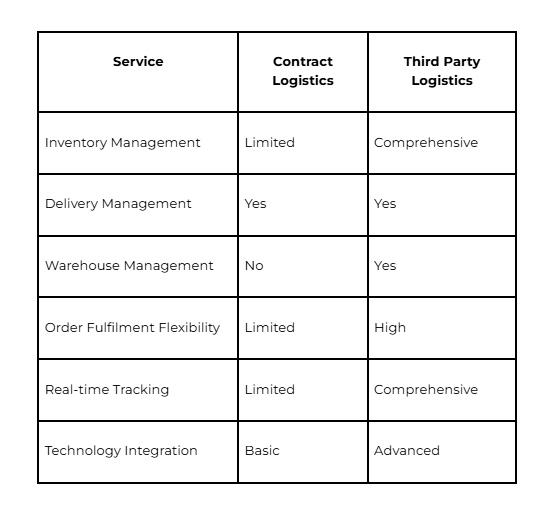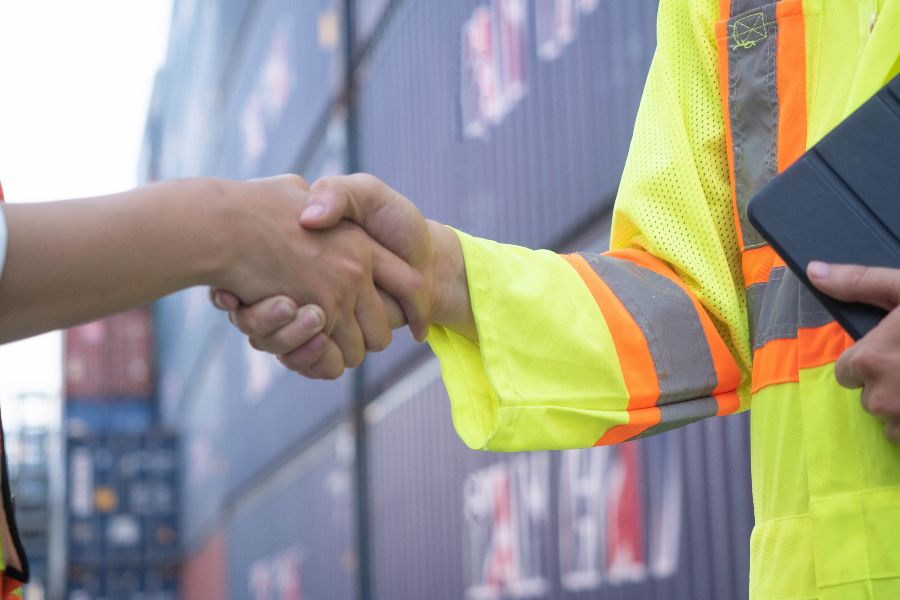Your Gateway to Streamlined Supply Chain Excellence
Ever wondered how global brands manage to get their products from factories to your doorstep seamlessly? The secret lies in contract logistics - a game-changing approach that's revolutionising how businesses handle their supply chain operations.
Whether you're a growing e-commerce brand or an established manufacturer, understanding contract logistics could be the key to unlocking significant cost savings and operational efficiency that positions your business for sustainable growth in today's competitive marketplace.
Understanding Contract Logistics Company: The Foundation
What Are Contract Logistics Services and Why They Matter
Contract logistics refers to the long-term outsourcing of warehousing, fulfilment, distribution and related value-added services, and, where required, transport management, to a specialist provider (often used interchangeably with "3PL"). Leading providers describe contract logistics as end-to-end inventory storage and order processing, not just transport coordination. This comprehensive approach differs fundamentally from traditional in-house logistics management, where businesses attempt to handle every aspect of their supply chain internally.
The term "logistics" has fascinating military origins, where the U.S. Army defines it as "the processes, resources, and systems involved in generating, transporting, sustaining, and redeploying or reallocating materiel and personnel." Today's contract logistics involves the coordination of third-party providers, which provide logistics services like warehousing, transportation, and distribution, creating a sophisticated network that enables businesses to focus on their core competencies.
Contract logistics solutions encompass various aspects of supply chain management, including planning and creating supply chains, designing facilities, warehousing, transporting and distributing goods, processing orders and collecting payments, managing inventory, and sometimes handling certain aspects of customer service. This holistic approach allows companies to leverage specialised expertise while reducing costs and improving efficiency across their entire distribution network.
This efficient approach enables providers to deliver tailored solutions that address specific industry requirements whilst maintaining more flexibility in service delivery.
Ready to Transform Your Supply Chain?
Don't let logistics complexity slow your growth. Our end-to-end logistics solutions streamline your entire supply chain from warehouse to doorstep. Call us now - (02) 9090 4747
The Mechanics of Contract Logistics Solutions
How Contract Logistics Solutions Actually Work in Practice
Contract logistics involves establishing long-term partnerships between businesses and specialised service providers who understand the intricacies of modern supply chain management. These relationships typically span one to three years (sometimes extending to five when providers invest heavily in automation or start-up costs) and are built on detailed service agreements that outline performance metrics, responsibilities, and operational standards.
Contract logistics providers work closely with clients to develop tailored solutions that address specific needs across the supply chain. They coordinate inbound and outbound freight, manage relationships with multiple freight forwarders, and utilise their global reach to negotiate more favourable shipping rates due to volume discounts. This collaborative approach ensures that inventory gets to where it needs to be efficiently, whether moving goods between manufacturers, distribution centres, or directly to customers.
Modern contract logistics companies utilise sophisticated warehouse management systems, transportation management platforms, and real-time tracking capabilities to provide visibility and control throughout the entire logistics process. These efficient systems integrate seamlessly with existing storage facilities and distribution networks, offering more flexibility in how businesses manage their inventory and fulfilment operations. This technology integration enables seamless communication between all stakeholders and supports data-driven decision-making that enhances supply chain efficiency.
Contract Logistics vs Third-Party Logistics: Clearing the Confusion
Spotting the Key Differences That Matter
In practice, contract logistics and 3PL refer to the same integrated service set. "Contract logistics" is the term providers like DHL Supply Chain and Kuehne+Nagel use for warehousing and fulfilment solutions delivered under multi-year contracts. Understanding this integration is crucial for making informed decisions about your supply chain strategy.
Contract logistics typically focuses on specific aspects of transportation and freight coordination. Contract logistics providers excel at arranging transportation, managing relationships with freight forwarders, and optimising shipping routes and modes of transport. They're particularly valuable for businesses that need expert assistance with moving goods between manufacturers, distribution centres, and third-party logistics providers, but may not require comprehensive warehousing or order fulfilment services.
In contrast, third-party logistics providers offer a full suite of logistics services that extends far beyond transportation management. 3PL companies handle warehousing, inventory management, order fulfilment, and often provide value-added services like product customisation, returns processing, and customer service support. They typically operate multiple distribution centres, allowing merchants to split inventory strategically based on demand patterns and customer proximity. This efficient storage approach provides more flexibility in inventory positioning whilst maintaining optimal service levels.

This distinction becomes particularly important for e-commerce businesses, where the choice between contract logistics services and comprehensive 3PL solutions can significantly impact operational efficiency and customer satisfaction.
Need Expert 3PL Guidance?
Confused about choosing between contract logistics and 3PL? Our 3PL providers in Sydney and Melbourne offer personalised consultations to help you make the right decision for your business needs. Explore today - (02) 9090 4747
Real-World Applications and Distribution Centres

Distribution Services and E Commerce Success Stories
Contract logistics solutions serve diverse industries through established global networks and specialised expertise:
- Major Global Players: The industry is led by established giants, including United Parcel Service and FedEx Supply Chain (United States), Kuehne + Nagel (Switzerland), and DHL Supply Chain (Germany). For the Australian context, Australia Post/StarTrack provides nationwide parcels and business solutions, whilst Team Global Express offers B2B/B2C parcels, freight, and their MyTeamGE portal for visibility. These companies have built extensive international networks spanning continents with decades of operational experience.
- E-Commerce Revolution: Contract logistics providers play a major role in online retail, taking comprehensive responsibility for warehousing, inventorying, packing, and shipping of e-commerce products. Australian providers like eStore Logistics exemplify this with automation-heavy fulfilment and returns processing capabilities. The digital commerce boom has created unprecedented demand for flexible, scalable logistics solutions that handle fluctuating order volumes and meet customer expectations for rapid delivery.
- Manufacturing Supply Chains: Companies rely on contract logistics partners to coordinate the complex movement of raw materials and finished goods, ensuring just-in-time delivery that minimises inventory carrying costs whilst maintaining production efficiency.
- Retail Distribution Services: Retailers utilise contract logistics to support omnichannel strategies, managing inventory flow between distribution centres, physical stores, and direct-to-consumer channels seamlessly.
- Automotive Industry Applications: The sector uses contract logistics for managing sophisticated supply chains with precise timing requirements, coordinating thousands of components from multiple suppliers to meet strict production schedules.
- Pharmaceutical Specialisation: Companies require expert contract logistics providers for temperature-controlled transportation, regulatory compliance, and secure handling of high-value medical products throughout the distribution network. In Australia, providers must meet the TGA (Therapeutic Goods Administration) wholesaling code and cold-chain requirements.
- Amazon's Internal Network: McKinsey has estimated that, if spun out, Amazon's logistics arm would rank as the 5th-largest 3PL globally—illustrating the scale and strategic value of logistics capability, demonstrating how even retail giants recognise the complexity and strategic importance of logistics operations.
The Business Benefits: Why Companies Make the Switch
Calculating Operational Efficiency and Business Practices
Contract logistics delivers transformative advantages that directly impact your bottom line and operational performance:
- Substantial Cost Savings: Eliminate the need to build and maintain costly logistics infrastructure, including shipping facilities, transportation fleets, packing materials, and specialised personnel. Companies can redirect these significant capital investments toward core business activities while achieving more cost-effective operations.
- Enhanced Negotiating Power: Large contract logistics companies leverage economies of scale to negotiate lower prices from suppliers across all aspects of logistics operations - from freight rates and warehouse space to packaging materials and insurance costs - delivering savings that individual businesses couldn't achieve independently. However, savings vary by business size and requirements, so avoid over-promising universal cost reductions.
- Access to Specialised Expertise: Gain immediate access to cutting-edge technology and deep industry knowledge that would be prohibitively expensive to develop internally. Professional logistics providers bring understanding of industry best practices, regulatory requirements, and emerging technologies that enhance operational efficiency and reduce risk exposure.
- Business Scalability and Flexibility: Benefit from flexible capacity that can expand or contract based on demand fluctuations without long-term commitments or infrastructure investments. This adaptability is particularly valuable for seasonal businesses, companies experiencing rapid growth, or those entering new markets with uncertain logistics requirements.
- Comprehensive Reverse Logistics: Transform product returns from a cost centre into a value-recovery opportunity. Contract logistics providers handle the entire reverse process of receiving, inspecting, refurbishing, or recycling returned items, maximising value recovery while maintaining customer satisfaction.
- Risk Mitigation: Transfer logistics-related risks, including regulatory compliance, technology obsolescence, and operational disruptions, to specialist providers who have the expertise and resources to manage these challenges effectively. However, some risks remain with the merchant, such as Australian Consumer Law obligations on delivery promises and customer service.
Making the Right Choice: Contract Logistics Partner vs In-House vs 3PL
Your Decision-Making Framework for Inventory Management Excellence
Selecting the ideal solution for your logistics needs requires careful evaluation of your business's current situation, growth trajectory, and operational requirements. The decision framework should consider several critical factors that will determine which approach delivers the best long-term value.
When Contract Logistics Makes Sense
Contract logistics makes the most sense for businesses that require specialised transportation management and freight coordination but prefer to maintain control over other aspects of their operations. This approach works particularly well for companies with established warehouse facilities that need expert assistance with shipping optimisation, carrier relationships, or international freight forwarding.
If you're willing to handle inventory management, order processing, and customer service internally, a contract logistics company can provide targeted expertise where you need it most.
When to Choose Third-Party Logistics (3PL)
Choose a third-party logistics provider when logistics complexity exceeds internal capabilities or when the time investment required for managing these operations detracts from core business activities. Companies experiencing rapid growth, expanding into new geographic markets, or struggling to meet customer expectations for delivery speed often benefit significantly from comprehensive 3PL partnerships.
When In-House Operations Work Best
Maintaining in-house logistics operations makes sense for businesses with sufficient scale, resources, and expertise to justify the investment. Companies with highly specialised products, unique handling requirements, or those where logistics represents a core competitive advantage may find internal management more strategic than outsourcing.
Key Decision Factors
For businesses evaluating their options, consider these critical decision points:
- Order Volume and Complexity: Companies processing hundreds of orders daily or managing complex product variations typically achieve better results through external partnerships rather than internal development.
- Geographic Distribution Requirements: Businesses serving customers across multiple regions or international markets benefit from providers with established networks and local expertise.
- Available Capital for Infrastructure Investment: Consider the substantial upfront costs required for warehouse facilities, transportation fleets, technology systems, and specialised personnel versus ongoing service fees.
- Internal Expertise Levels: Evaluate whether your team has the knowledge and experience to manage logistics operations effectively, including regulatory compliance, carrier relationships, and technology integration.
- Strategic Priorities for Resource Allocation: Determine whether logistics management aligns with your core business competencies or if resources would be better invested in product development, marketing, or other strategic initiatives.
- Decision Timeline Requirements: Building internal logistics capabilities requires substantial upfront investment and months or years of development, while partnering with established providers enables immediate access to sophisticated capabilities and proven systems.
Compliance Note (Australia): If you publish delivery windows, ensure your provider can consistently meet them; misrepresenting delivery timeframes can breach the Australian Consumer Law. The ACCC has actively enforced this in 2024–25. Build penalties/service credits into your SLA and align website copy to operational reality.
Take Control of Your Inventory Today
Stop playing guessing games with stock levels. Our inventory forecasting and order orchestration tools help you optimise inventory across multiple channels. Contact us today - (02) 9090 4747
Transform Your Supply Chain: The Strategic Advantage Awaits

The logistics landscape continues evolving at unprecedented speed, and businesses that embrace strategic outsourcing through contract logistics are positioning themselves for sustainable competitive advantage. Whether your primary objectives include reducing costs, improving operational efficiency, or scaling operations to support growth, understanding the nuances between different logistics solutions enables informed decision-making that supports long-term success.
The question isn't simply whether to outsource your logistics operations, but rather identifying the right partnership approach that aligns perfectly with your business goals, customer expectations, and growth aspirations. Contract logistics offers a strategic pathway to enhanced supply chain performance, enabling businesses to leverage specialist expertise while maintaining focus on their core competencies.
As supply chain complexity continues increasing and customer expectations for fast, reliable delivery become more demanding, the strategic value of professional logistics partnerships will only grow. Companies that recognise this trend and act decisively to optimise their logistics operations through contract logistics solutions position themselves not just for operational efficiency, but for sustainable competitive advantage in an increasingly complex marketplace.
